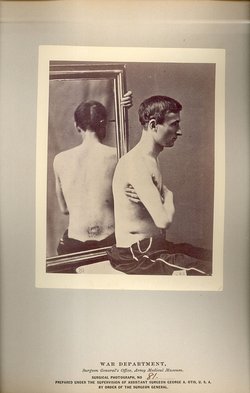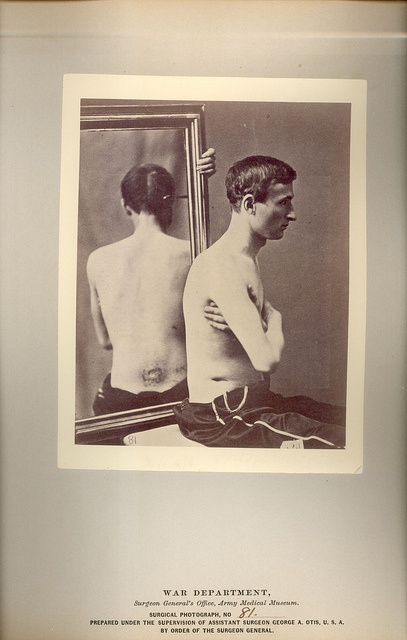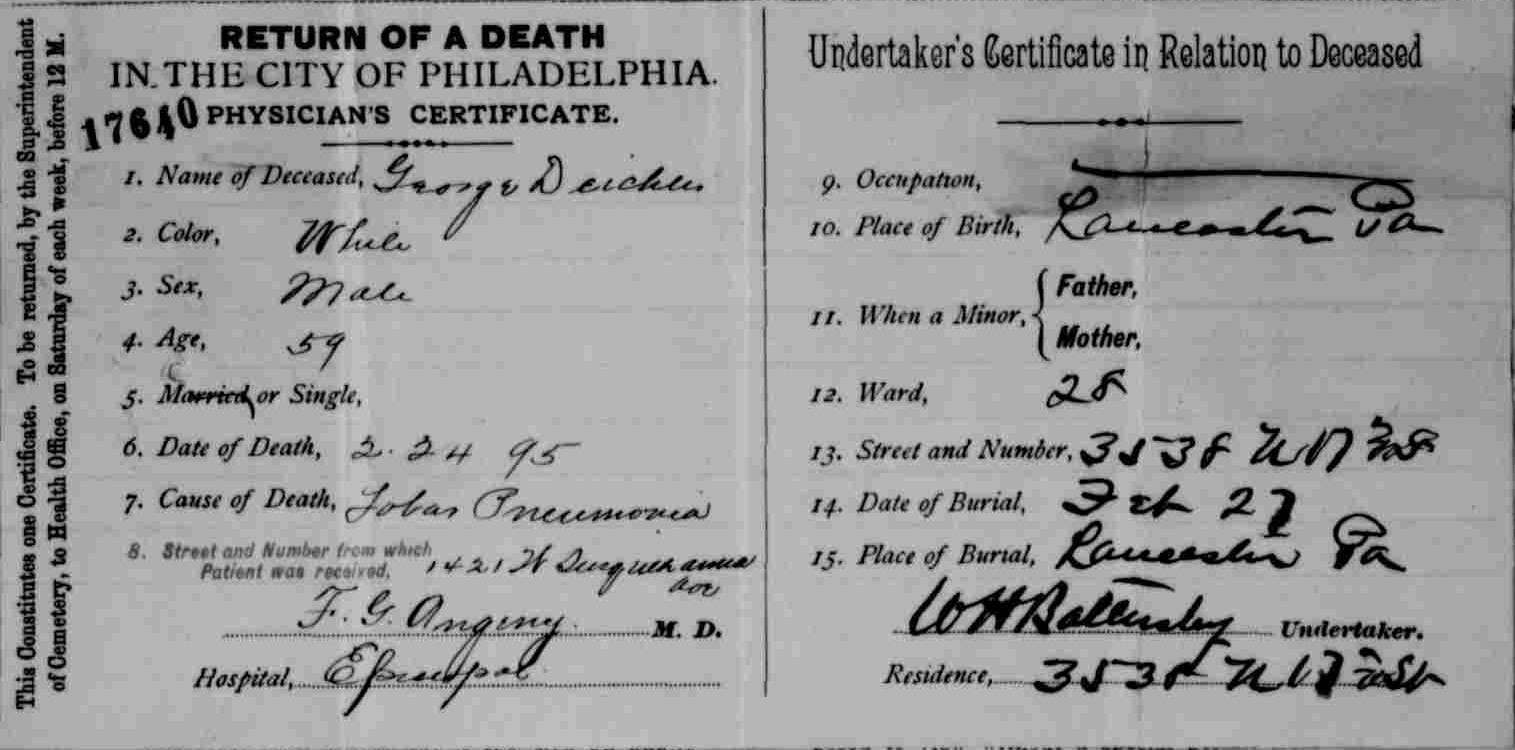"Among the non-commissioned officers who supervised the movement of Company I from the wall was Corporal George P. Deichler, a 24-year old machinist from Lancaster, Pennsylvania, where he lived with his father, Philip. During the action, a Virginian's bullet hit Deichler in the left groin. This serious and very painful wound laid the corporal up for many months. He recovered though, and returned to his regiment only to be wounded again at Ream's Station, on August 25, 1864, where a shell fragment struck him in the head and a minnie ball hit his knee. Though he spent nearly six months in convalescence, Deichler was tough, and he returned to the regiment in March, 1865, and was promoted to 1st Lieutenant. Nine days after his promotion, on March 25, 1865, at the 2nd Battle of Hatcher's Run, a Confederate bullet hit Deichler in the lower part of the stomach and blew a hole in his back. Deicheler's captain, Joseph Garrett, wrote of the wound; "I considered it serious as the fluids and other matter was coming out from the Bowels." This, Deichler's fourth wound, finished his soldiering, though somehow his iron constitution pulled him through and he survived it. He received his discharge and was pensioned at $17 a month beginning August 10, 1865.
Sometime after his discharge Deichler moved to Indianapolis. He met Annie E. McDougal there. She had recently divorced her first husband, and on July 26, 1875, John G. Smith, a Minister of the Gospel, married Annie and George. But the marriage that began with high hopes unraveled over the next six years. George's Gettysburg wound in the groin may have had something to do with the problems the couple experienced. He also drank heavily, probably to ease the constant pain that assailed his body from his four wounds. To make ends meet, Annie had to take in boarders, and find whatever other work she could. It was not enough. On June 4, 1881, Deichler left his wife and returned to Lancaster to live with his father. There was no divorce, Deichler simply left.
One year later, Deichler sought employment with Davis Kitch, who had the contract with the city of Lancaster to light the city street lights. He started on July 1, 1882, but had to quit several days later, "as he was unable to stand the fatigue of walking and the exertion incident to such employment." In an affidavit, Kitch stated that he "does not know of any lighter or easier employment than lighting lamps and he [Deichler] is utterly unfitted for that work." Deichler described his tortured life in a statement accompanying his claim for a pension increase in December, 1888.
I'm nervous have continual pain inside of body my wounds of knee and groin pain me. Can not hold my water any more, it depresses (?) me. Had an operation three years ago, [unintelligible words]. No sexual desire any more. Never had children. Never sick during war. Have been laid up last year from pains and nervous.
Deichler's request for increase was denied. He continued to request increases regularly, but each one was denied. In 1894 the examining surgeon wrote that Deichler, "seems demented & melancholic," and that he was a "pale, tremulous man" with a "mind enfeebled." Five years later, on February 24, at age 60, Deichler died of pneumonia. That he lived as long as he did is remarkable, but the Confederate bullet at Gettysburg and his subsequent wounds left him a broken, unhappy, and lonely man, and slowly sapped his life from him."
Biography source - Historian D. Scott Hartwig
http://www.nps.gov/history/history/online_books/gett/gettysburg_seminars/5/essay1.htm
"Among the non-commissioned officers who supervised the movement of Company I from the wall was Corporal George P. Deichler, a 24-year old machinist from Lancaster, Pennsylvania, where he lived with his father, Philip. During the action, a Virginian's bullet hit Deichler in the left groin. This serious and very painful wound laid the corporal up for many months. He recovered though, and returned to his regiment only to be wounded again at Ream's Station, on August 25, 1864, where a shell fragment struck him in the head and a minnie ball hit his knee. Though he spent nearly six months in convalescence, Deichler was tough, and he returned to the regiment in March, 1865, and was promoted to 1st Lieutenant. Nine days after his promotion, on March 25, 1865, at the 2nd Battle of Hatcher's Run, a Confederate bullet hit Deichler in the lower part of the stomach and blew a hole in his back. Deicheler's captain, Joseph Garrett, wrote of the wound; "I considered it serious as the fluids and other matter was coming out from the Bowels." This, Deichler's fourth wound, finished his soldiering, though somehow his iron constitution pulled him through and he survived it. He received his discharge and was pensioned at $17 a month beginning August 10, 1865.
Sometime after his discharge Deichler moved to Indianapolis. He met Annie E. McDougal there. She had recently divorced her first husband, and on July 26, 1875, John G. Smith, a Minister of the Gospel, married Annie and George. But the marriage that began with high hopes unraveled over the next six years. George's Gettysburg wound in the groin may have had something to do with the problems the couple experienced. He also drank heavily, probably to ease the constant pain that assailed his body from his four wounds. To make ends meet, Annie had to take in boarders, and find whatever other work she could. It was not enough. On June 4, 1881, Deichler left his wife and returned to Lancaster to live with his father. There was no divorce, Deichler simply left.
One year later, Deichler sought employment with Davis Kitch, who had the contract with the city of Lancaster to light the city street lights. He started on July 1, 1882, but had to quit several days later, "as he was unable to stand the fatigue of walking and the exertion incident to such employment." In an affidavit, Kitch stated that he "does not know of any lighter or easier employment than lighting lamps and he [Deichler] is utterly unfitted for that work." Deichler described his tortured life in a statement accompanying his claim for a pension increase in December, 1888.
I'm nervous have continual pain inside of body my wounds of knee and groin pain me. Can not hold my water any more, it depresses (?) me. Had an operation three years ago, [unintelligible words]. No sexual desire any more. Never had children. Never sick during war. Have been laid up last year from pains and nervous.
Deichler's request for increase was denied. He continued to request increases regularly, but each one was denied. In 1894 the examining surgeon wrote that Deichler, "seems demented & melancholic," and that he was a "pale, tremulous man" with a "mind enfeebled." Five years later, on February 24, at age 60, Deichler died of pneumonia. That he lived as long as he did is remarkable, but the Confederate bullet at Gettysburg and his subsequent wounds left him a broken, unhappy, and lonely man, and slowly sapped his life from him."
Biography source - Historian D. Scott Hartwig
http://www.nps.gov/history/history/online_books/gett/gettysburg_seminars/5/essay1.htm
Family Members
Advertisement
Advertisement












